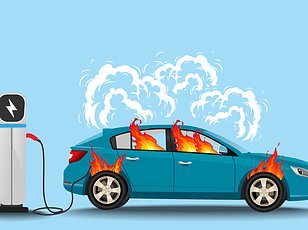Vehicle fires down 14% since the pandemic but fatalities RISE - and experts can't explain why
- People are more likely to die in car fires than vehicle fires in general, data shows
The number of people killed in vehicle fires in England have increased despite the volume of blazes falling annually since the pandemic, new figures show.
Incidents where vehicles have set alight declined between 2019 and 2021 - as a result of lockdowns and fewer people driving - and have remained consistently low ever since.
However, the number of fatalities has consistently been stubbornly high, with over 130 deaths caused by vehicle fires over the last five years.
As many as 35 people died in vehicle fires last year alone – 25 of which were in cars, data sourced from Home Office shows. And experts can't explain why this is the case.

Government's fire statistics show that 136 people in England have died in vehicle fires in the last five years - 100 of them in cars
In the past two financial years, 'primary' fires have fallen 11.8 per cent, while vehicle fires in that category have fallen 13.6 per cent, AA analysis reveals.
A fire is classified as 'primary' if it occurs in a building, vehicle or outdoor structures; results in casualties or rescue; and/or requires the use of five or more pumping appliances.
But while deaths in vehicle fires averaged 23 annually in the five years before the Covid-19 outbreak, they have risen to an average of 28.5 per annum in the past two.
In cars, fatalities in such incidents averaged 16.8 annually prior to Covid but have risen to 19.5 a year since the end of lockdowns.
The Government's fire statistics (based on blazes attended by fire rescue services in England) shows that 136 people have died in vehicle fires in the last five years - 100 of them in cars.
A further 2,409 suffered burns or other non-fatal injuries in all vehicle fires, of which 1,338 were in cars.
It means a casualty was more likely to die in a car fire (7 per cent) than in a vehicle fire overall (5.3 per cent).
The statistics show that a primary car fire is now more likely to be accidental, as opposed to deliberate, than before the pandemic - between 62 per cent and 63 per cent now compared to between 51 per cent and 54 per cent in the half-decade before lockdowns.
'Against a general trend of fewer primary fires, the number of vehicle fires stands out as going down even faster. Yet, they appear to be getting more lethal, which is a major worry,' said Tony Rich, AA spokesman on road incidents and hazards.
And the motoring group is perplexed as to why this is the case.
'It is hard to put a finger on a specific reason for the decline in car fires,' Tony added.
'However, a lower percentage of deliberate fires is a big indicator, perhaps due to improved security systems now appearing in older cars. That could mean older cars are less likely to be stolen and then torched.
'Fewer people smoking may be a factor.'
'A less obvious one though is the impact of more modern, much simpler and safer plug-in technology for adding electrical items to a car, such as in-car entertainment, dash cams, mobile phones and sat-navs.'

A casualty was more likely to die in a car fire (7%) than in a vehicle fire in general (5.3%) in the last 5 years, official figures suggest
Concerns have been raised about fully electric and hybrid cars and how susceptible they are to setting on fire.
However, various experts and research papers have found that EVs are less likely to trigger blazes than cars with internal combustion engines - though EV fires are notoriously more difficult to put out when they do start.
'AA patrols, who are used to trying to trace the cause of an electrical fault in a broken down older vehicle, recognise the danger when they find botched wiring that is one spark away from a short circuit and then a fire. Thankfully, it is less common than it used to be.'
Last October, a fire caused by a diesel vehicle at Luton Airport's Terminal Car Park 2 made headline news as the rapid blaze tore through the structure, ultimately causing significant collapse.
While nobody was killed in the incident, over 1,400 vehicles were damaged or destroyed.

































































